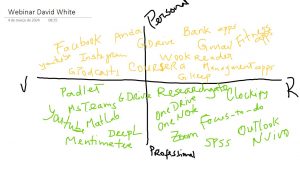I’m attending the ONL 241 course which is very challenging as I don’t have much available time (as many other people). But I’m finding it very interesting and useful!
Last week I watched the recording of the webinar with David White, which was very inspiring. David challenged the participants to draw a map of their footprint in the digital world. I thought it could be funny to draw mine and was surprised with what I got.

I thought of myself as a technological person, as I always look for tools that can make life (and especially work) easier and less time-consuming. Now, I consider ‘technology’ as a set of tools, and ‘digital’ as the way of using technology, but I’m not sure if technology is always digital. Is it?
Maybe I am more ‘digital’ than I thought I was. In fact, I never thought about the concept of digital applied to me. Nevertheless, as an example, I almost don’t use pen and paper to take notes… I use OneNote for professional notes, and Goggle Keep for personal ones.
Doing the map, I realised that I have two identities that I keep separate: the personal (in yellow) and the professional (in green).
It seems that I am moving through the continuum, being more of a visitor in some digital spaces and more of a resident in others. For example, I use Facebook and Instagram with personal accounts, but I almost don’t post anything there as I don’t like to expose my personal life. In the professional spot, essentially, I use tools that enhance productivity. Still, I am distant from being a real resident in the sense of producing content for digital sharing, that is, for sharing on the internet. But I have a doubt… being a resident in David White’s continuum means being an expert in the use of digital tools, or it means leaving a footprint on the internet?
The internet can be a very dangerous place, especially for personal exposure! Besides phishing practices, when we expose our opinions, we are subject to receiving unpolite comments from people who disagree. Yes, disagreement is positive as it can lead people to think better about a subject, but rudeness is not acceptable.
That brings me to the scenario set up for topic 1, ‘online participation and digital literacies’, and the debates in the Take V PBL group meetings. The group has come to focus on Critical Thinking Skills (CTS) as being important to filter the huge amount of information available on the internet. Critical thinking allows people to evaluate the trustworthiness of the information and its applicability. I believe that CTS are fundamental for every person in every context and not only for digital use. CTS should be developed in educational contexts since early childhood. I believe that the development of CTS could impact positively on relationships and, therefore, contribute to a better world as it would improve inclusion and social justice.
Is it a utopian view? I don’t believe in utopia, as several past utopias are a reality nowadays.
Best,
AD
Comments
I really like your post, especially the way you presented yourself in digital spaces, as you are moving through the continuum.
Thank you for your comment, Vesna. 🙂
I completely agree with your perspective. My digital footprint is quite similar to yours, and I share similar uncertainties in sharing personal aspects.
With regards to your question in the blog: I personally do not think that being in a resident mode on a platform such as SPSS (with which I work a lot) makes me an expert, rather I believe it refers to the amount of engagement I have with the software. But, that’s just my perspective.
Great job!
Thank you for your comment, Shashank!
I guess you introduced a new aspect about the visitors-resident continuum: engagement.
So, what makes us a resident in the digital world? Is it the expertise in the use of a given tool, the engagement using that tool, or leaving a footprint in the internet?
Or anything else?
Best wishes!
I share the same concern as you as I thought about being a resident as someone who has a digital footprint. It’s quite sad really, to have something that was intended to make the world a smaller place, to potentially backfire on us due to social issues and potential privacy breaches. In fact, I used to actively post on Facebook when it first came out, but I now only use it to interact with hobby groups, haha!
Thank you for your comment, Jonathan!
Alexandra – great post – I totally agree with you – maybe we are more ‘digital’ than we thought we were. After David White’s webinar I was pondering for a while and decided – I am definitely more of a resident than visitor.
Thank you for your comment, Aneé! 🙂
Alexandra, I also have similar experiences with either being a visitor or resident on the web, and I haven’t thought about it much, though. When I made my map in the webinar, I completely forgot to put some things on the map, such as Research Gate, for example, and some other digital spaces for sharing scientific work since I considered it more as regular part of my job and didn’t see it as online participation and interaction, but it is, isn’t it? We recommend articles there, follow projects, etc.
Looking forward to our further discussions in the group.
Thank you for your comment, Dragana!
It is interesting to realise how much the people participating in ONL 241 have similar experiences with the digital world, even being from so different places and cultures 🙂